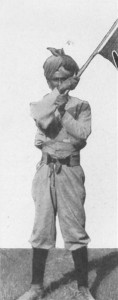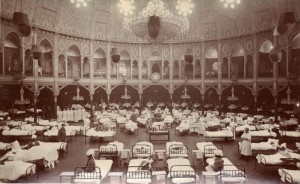The last few years have seen a long-overdue awakening of interest in the Indian soldiers and auxiliaries who participated in the First World War (it goes without saying that I use the word ‘Indian’ here in its pre-1947 sense, when it applied to people from all over the subcontinent).
David Omissi, the military historian, was one of the pioneers: his Indian Voices of the Great War: Soldier’s Letters, 1914-18 (Palgrave, 1999) is a monumental work. It is an edited collection of the correspondence between Indian soldiers in Europe and their families in the subcontinent. These letters were examined by censors, which is why they have been preserved. Of course the soldiers knew their letters would be scrutinized so they were careful to watch what they said (a comment in the first letter below is evidence of this: ‘Even this I have had to write very prudently, otherwise it would be withheld’). But these letters are still uniquely valuable in that they have preserved the words of a group of men whose voices are very rarely heard.
Below are some examples.
”]”]

Daya Ram (Jat) to Kalu Ram (Ambala City, Punjab)
[Letter No. 394.]
2nd Lancers [Urdu]
France 6th September, 1916
I went into the trenches on 7th August and returned on 28th August. Some of our men were wounded. I am not permitted to give any fuller details. The battle is raging violently, and various new ways of fighting have been introduced. The ground is honeycombed, as a field with rat holes. No one can advance beyond the trenches. If he does so, he is blown away. Mines are ready charged with explosives. Shells and machine guns and bombs are mostly employed. No one considers rifles nowadays, and serviceable rifle ammunition is lying about as plentifully as pebbles. At the trenches, thousands of maunds of iron, representing exploded shells, lie on the ground. At some places corpses are found of men killed in 1914, with uniform and accoutrements still on. Large flies, which have become poisonous through feasting on dead bodies, infest the trenches, and huge fat rats run about there. By the blessing of God the climate of this country is cold, and for that reason corpses do not decompose quickly. It rains frequenly and that causes much inconvenience. At the present time we are suffering, as the horses are tethered outside and the rain has converted the ground into slush. Sometimes we have to march in the rain and then the cold is intense. However after two years’ experience, we have grown used to all these troubles and think lightly of them. I have lots to write about, but I have no leisure, nor have I permission to do so. Even this I have had to write very prudently, otherwise it would be withheld.
[the letter was passed by the censors]
[Indian Voices of the Great War , p.231]
”]

[Letter No. 401]
Jemadar Indar Singh (Sikh) to Chattar Singh (Ludiana Disst, Punjab)
FPO.42 Urdu
France 15th September, 1916
I am off for a cavalry attack on the 15th September. It is quite impossible that I should return alive because a cavalry charge is a very terrible affair, and therefore I want to clear up several things which are weighing on my heart at present. Firstly, the sharp things you have written to me have not annoyed me. Don’t be grieved at my death because I shall die arms in hand, wearing the warrior’s clothes. This is the most happy death that anyone can die. I am very sorry that I have not been able to discharge my obligations towards my family because God has called me already. Well, never mind; you must forgive me. I have abandoned to you all my worldly possessions which you must make use of without hesitation. Don’t worry your grandparents after I am gone. Give my love to my parents and tell them not to grieve as we must all die some day. Indeed this day of death is an occasion for rejoicing. [Letter passed]
”]”]

And in a different vein, Letter No. 408.
Farrier Major Khan to Wali Mahomed Khan (Punjab Muslim, 18th Lancers, France)
Jhelum [Urdu]
Punjab 19th Sept 1916
I have heard all about your amours with the French women and how the officers forbid it. I can quite imagine how, if you know enough of the language, you have a great time and try to make yourself out a trustworthy person. I have no doubt you are always meeting the French people. It is a great pity that you never write any real account of the war in France. No doubt your officers read the letters. But cannot you devise any way of dodging them? I will tell you what to do. When you write a letter, on one page write in invisible ink made out of lemon juice and I will read everything. If you cannot get this, take some lime which has not been wetted and grind it up and mix it with water and write and I shall be able to read it all…
[Indian Voices of the Great War, p. 239]

And, on opium:
[Letter no 431]
Kartar Singh (Sikh) to Sirdar Ram Rakha Singh (Jullundur District, Punjab).
6th Cavalry [urdu]
France 6th Nov, 1916
You say in your letter that the postmaster of Adampur had taken out some opium. What was the necessity of telling him? You should not have said a word on the subject to him, and should not have mentioned it in your letter. When you send opium you should not mention it, but should say you are sending a preparation for the beard and should send it off secretly. You have made a great mistake. I get everything you send.
[a footnote appended to this letter says: ‘The censor commented, ‘this advice about the dispatch of opium has been deleted from the letter.’]

Would you know whether at all there were any (war) poems written by Indian (poet-)soldiers who were on active service during the Great War, eg, in the North of France or the southern sectors of the Ypres Salient? Or could you mention somebody who might be in the know and whom I could approach with a view to obtaining closer information?
Thanking you in anticipation.
No I don’t know of any. The best person to write to is Santanu Das.
Hi amitav,
very nicely written and the extracts from the book are just a delight in human emotions. Would you possibly know where I can get the book from. Flipkart and the other online sellers show it as out of stock and it is very expensive to import it from outside the country.
I live in Delhi, if you know of any place or person I can get it from , it would be a great help.
Thanks
Meanwhile you get the book Siddharth, some letters from that war, here:
http://www.cwgc.org/foreverindia/letters/